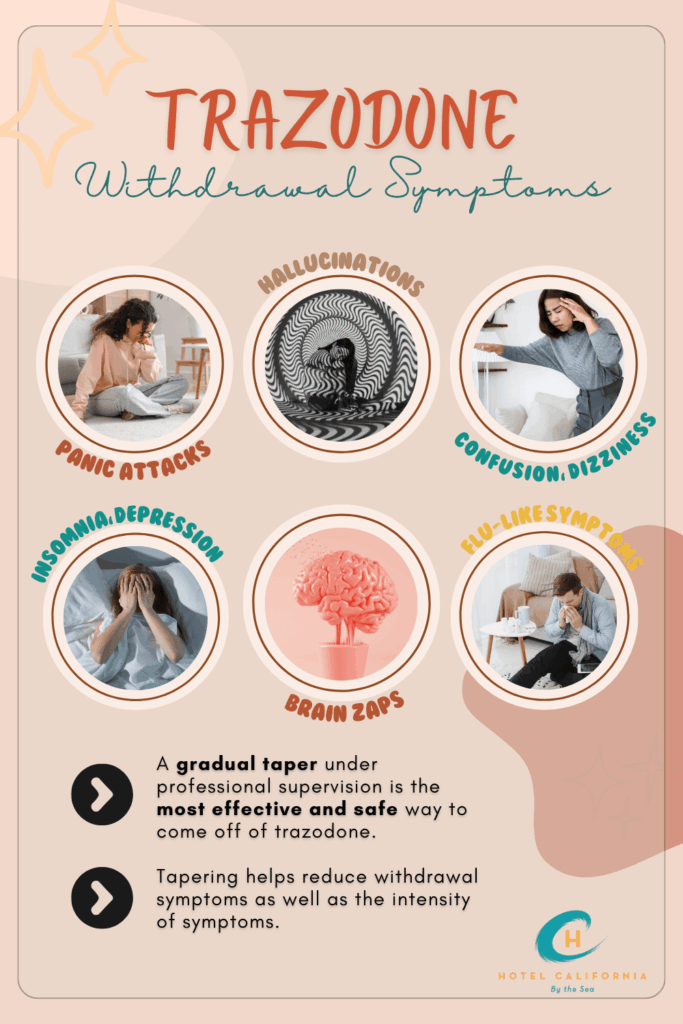Trazodone Withdrawal
Trazodone is an antidepressant medication that can cause dependence and lead to trazodone withdrawal symptoms. Antidepressants are among the top three most prescribed therapeutic medications in the US. According to the CDC, between 2011 and 2014, an estimated 12.7% of Americans over the age of 12 reported using antidepressants in the prior month.

Antidepressant medications are not known to be addictive or habit-forming. They are not associated with drug-seeking behaviors. But in selective serotonin reuptake inhibitors (SSRIs) and serotonin antagonist and reuptake inhibitors (SARIs) like trazodone, the increased levels of serotonin can turn into physical dependence. When a user has developed a dependence and stops medication use, withdrawal symptoms may occur.
Antidepressant discontinuation syndrome is another common name for antidepressant withdrawal. A Cleveland Clinic study found that between 27-86% of people on antidepressants can experience withdrawal when they attempt to stop after at least 6 weeks of use.
What is Trazodone?
Trazodone is a prescription drug used to treat major depressive disorder and insomnia. It also produces anxiety-reducing effects, which can be useful in the treatment of various types of anxiety disorders as well. In some cases, it has been prescribed off-label to treat symptoms of insomnia in those in treatment for alcohol use disorder.
Trazodone is considered a long-term use medication. Common brand names of the drug include Desyrel, Dividose, and Oleptro. Trazodone works by increasing levels of serotonin in the brain. Serotonin is a neurochemical associated with mood regulation.
When there are low levels of serotonin, it can cause symptoms of depression and other mental disorders. By targeting receptors that block the reuptake of serotonin, there is more of the chemical available in the brain for use. When there is more serotonin available, it can boost mood and help with symptoms of depression and anxiety.
Why is Trazodone prescribed over other Antidepressants?
Trazodone is not necessarily the first choice for an antidepressant medication. But it can be prescribed over other medications for various reasons. Sometimes other antidepressants are not as well tolerated. Therefore, trazodone might be prescribed as being more effective for that specific patient.
The reduced cost. Trazodone is less expensive compared to other insomnia-treating medications because it is available in generic forms. It is not considered addictive. Trazodone is not considered an addictive medication, unlike other sleep aids such as benzos.
It can help prevent cognitive decline. The medication helps improve sleep patterns, which can also impact certain age-related mental issues. This helps prevent faster mental decline. Trazodone is also known to be more effective in specifically treating conditions such as sleep apnea.

Trazodone Withdrawal
Trazodone withdrawal is typically mild compared to other antidepressants. But it can be uncomfortable causing you to miss work or develop psychological issues. Withdrawal symptoms are more likely to occur with a longer duration of drug use and with a medication that has a short half-life. Trazodone withdrawal happens when there are abrupt changes in serotonin levels in the brain. The brain will sense this and try to correct itself, which can lead to a temporary imbalance. This imbalance causes withdrawal symptoms.
What are some factors or events that can cause a person to go into trazodone withdrawal other than abruptly stopping drug use? If you accidentally miss a dose or two, that can play a role in withdrawal. Chances are that a single dose or two will not have a huge impact. However, if you continue to miss doses of medication, it can lead to the development of withdrawal symptoms. If you transition to a different antidepressant, the new drug might work differently. Because the medication affects the brain differently, this can also cause withdrawal.
Typical Trazodone withdrawal symptoms include:
- Rebound insomnia
- Irritability and panic attacks
- Nausea and vomiting
- Dizziness and lightheadedness
- Headaches
- Brain zaps
- Flu-like symptoms
- Sensory disturbances and hallucinations
- Hyper arousal
- Confusion
- Hypomania
- Seizures
- Amnesia
- Rebound depression that leads to increased suicidal thoughts and ideation
- Difficulty concentrating
- Depersonalization
The majority of withdrawal symptoms will peak in the first week of drug cessation. After about 2 to 6 weeks, acute symptoms will typically resolve and improve. Trazodone’s half-life is anywhere from 3-9 hours. It generally takes a total of 15-45 hours for the medication to be fully eliminated from the body. Because trazodone’s half-life is much longer than other antidepressants, the onset of withdrawal can take longer to appear.
Check Your Insurance Coverage for FREE
Find out if your insurance covers addiction treatment in minutes. We accept most insurance!
Withdrawal Timeline
- Early Withdrawal – During the first few days of drug discontinuation, the user can experience symptoms such as irritability, anxiety and rebound insomnia.
- Acute Withdrawal – During the first week, symptoms will intensify and include dizziness, nausea, headache and flu-like symptoms.
- Peak Withdrawal – With the 2-3 week period, symptoms include mood swings, increased anxiety and persistent insomnia.
- Subacute Withdrawal – Within 3-5 weeks, symptoms will gradually start to subside.
- Complete – Users should be done with withdrawal by 6-8 weeks.
Factors that impact the intensity of Withdrawal
- Dosage of trazodone
- Duration of trazodone use – the length of time during which the medication was taken
- If drug use were abruptly stopped
- If a tapering method was used to help detox from trazodone
- Individual biology and sensitivity to the drug
- Underlying health condition
- Psychological conditions such as stress and anxiety
- The use of other drugs, prescription or otherwise
- Overall health and lifestyle
- Social support from friends, family and professionals
The most effective way to treat Trazodone Withdrawal
A gradual taper under professional medication supervision is the most effective and safest way to come off trazodone. It helps reduce withdrawal symptoms as well as the intensity of symptoms. When you gradually reduce the dose of the drug over time, it allows the body to slowly adjust to a lower dose until you have completely stopped drug use. Always take prescription medications like trazodone, as prescribed by your medical provider. And avoid abrupt cessation of the drug. This helps to avoid or lessen uncomfortable withdrawal.
Reach out to Hotel California by the Sea
We specialize in treating addiction and other co-occurring disorders, such as PTSD. Our Admissions specialists are available to walk you through the best options for treating your addiction.
Treatment for Substance Use Disorder
When a person takes an antidepressant, the level of serotonin increases in the brain. These neurotransmitters help with nerve cell communication. When they are suddenly lowered due to drug use cessation, it can cause the brain to scramble in order to rebalance itself. This occurrence is referred to as withdrawal. Drug dependence and withdrawal are serious conditions that could escalate into drug addiction. Professional behavioral health programs can help clients treat their substance addiction.
We offer treatment at all levels of care including detox, residential, PHP and IOP. We utilize evidence-based treatment methods such as CBT, DBT and EMDR therapy. Hotel California by the Sea is dedicated to helping clients reach their goals of sobriety and overcome their addiction.
References:
https://www.avenuesrecovery.com/understanding-addiction/addiction-withdrawal/trazodone-withdrawal
https://www.aafp.org/pubs/afp/issues/2006/0801/p449.html
https://www.addictioncenter.com/antidepressants/trazodone
https://www.choosingtherapy.com/trazodone-withdrawal
https://www.healthline.com/health/sleep/trazodone-for-sleep
https://delphihealthgroup.com/sedatives/trazodone/withdrawal/
